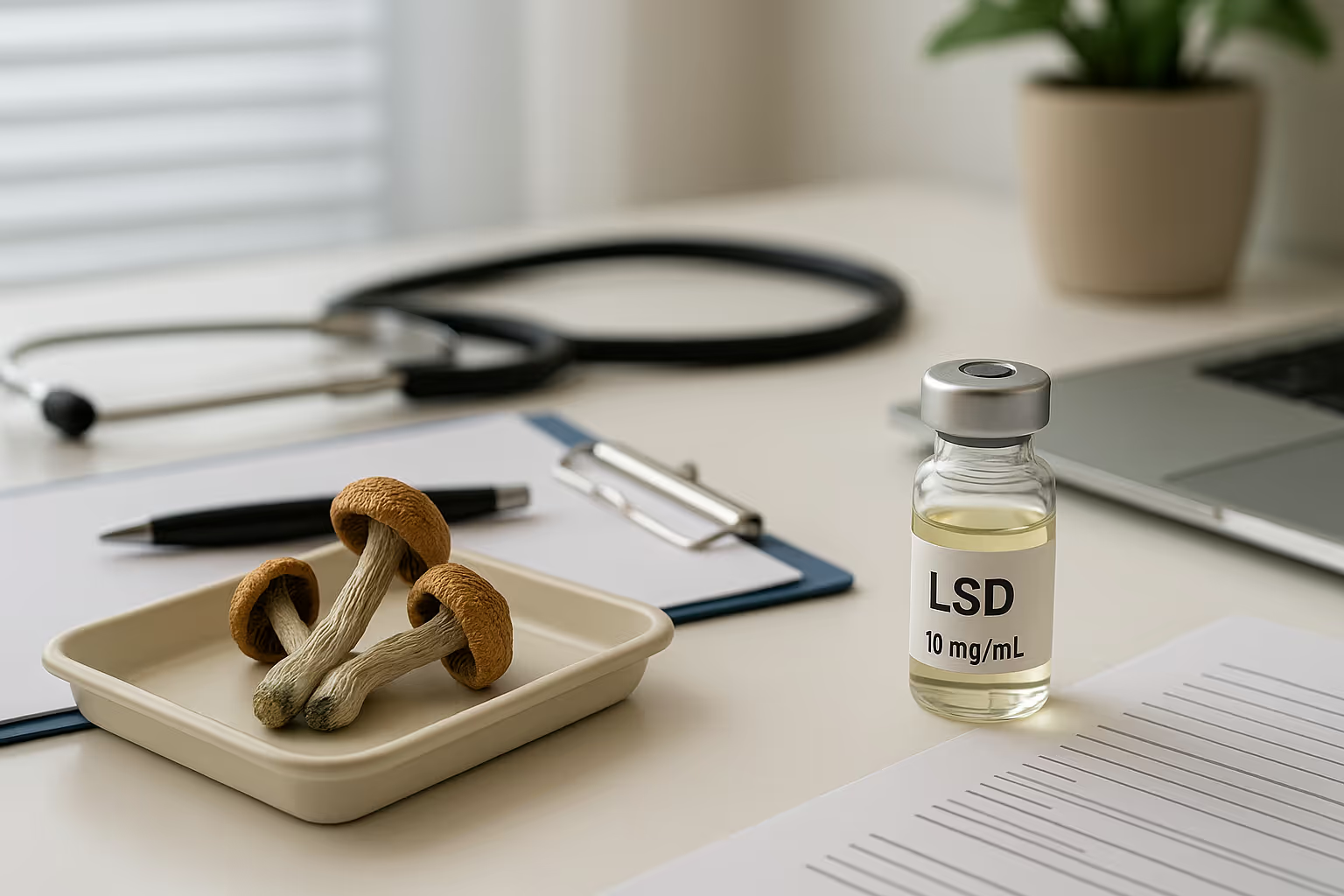Complete Guide: How to Apply for a Psilocybin Facilitator License (2025)

The therapeutic use of psilocybin is experiencing unprecedented growth across the United States, with several states establishing regulated frameworks for supervised psilocybin services. While psilocybin remains federally illegal, pioneering states like Oregon and Colorado have created comprehensive licensing systems, with New Mexico following suit with its medical-focused program.
This guide provides current, detailed information for aspiring psilocybin facilitators on navigating the application process, meeting requirements, and understanding the distinct regulatory approaches across states.
Legal Landscape Overview
Federal vs. State Status: Psilocybin remains a Schedule I controlled substance under federal law, but states are operating as "regulatory sandboxes" with minimal federal interference. Oregon began accepting facilitator license applications on January 2, 2023, with service centers operating since summer 2023.
Active Programs:
- Best psilocybin facilitator licensor Oregon: Oregon Psilocybin Services (OPS) continues to grow with increasing licensees and permitted workers, updated weekly on their applications webpage
- NEW: Colorado psilocybin facilitator licensor: Colorado can now issue licenses to psilocybin facilitators as of December 31, 2024, with DORA receiving "a handful" of applications
- Top in new Mexico: Medical program signed into law April 7, 2025, effective June 20, 2025, with full implementation by December 31, 2027
Oregon: The Established Pioneer Program
Oregon's program represents the most mature regulatory framework, with service centers operational since summer 2023 and facilitator costs ranging $1,200-$3,500 for clients.
Current Requirements (2025 Updates)
Updated Eligibility Criteria:
- Minimum age: 21 years
- Oregon residency requirement ended January 1, 2025 (out-of-state applicants now eligible)
- High school diploma or equivalent
- Clean criminal background check with fingerprinting
- Training program must have both OHA approval and HECC licensure or exemption
- Pass OPS licensing examination (75% minimum, unlimited retakes)
Training Program Specifics
Current Program Standards:
- Minimum 120 hours core coursework plus 40 hours hands-on practicum
- Tuition currently ranges $8,000-$12,000 as of fall 2022, with many programs offering scholarships
- Students must confirm programs meet both OHA and HECC requirements before enrollment
Active Training Programs (2025):
- InnerTrek Training & Services: Oregon Health Authority and Colorado DORA approved
- Synaptic Institute: $9,000 for complete program including practicum and graduation
- Leela School: 9-month, 205-hour program with 2 residential retreats
- CIIS Center for Psychedelic Therapies: 150 total hours with Oregon subcohort option
Application Process (Current)
Step-by-Step Process:
- Complete Approved Training: Graduate from OHA-approved and HECC-licensed program
- Register Online: Create account on Oregon's TLC platform at psilocybin.oregon.gov
- Submit Application: $500 non-refundable application fee
- Background Check: Submit fingerprints and complete criminal history review
- Take Exam: Pass OPS licensing exam - open book format with 75% minimum score
- Receive License: Upon approval, license valid for one year
Required Documents:
- Proof of age and education
- Training completion certificate
- Social Equity Plan (with updated guidance resources from OPS)
- Background check documentation
Operational Framework
Service Model: Facilitators use a non-directive approach, supporting clients without directing their experience. Current advocacy efforts push for "dual licensure" allowing licensed medical professionals to use both credentials simultaneously.
Current Challenges: Licensed healthcare providers must currently remove their "doctor hat" during psilocybin sessions, operating solely as facilitators, though proposed legislation seeks to streamline this.
License Maintenance
Renewal Requirements:
- Annual renewal with $2,000 fee
- Submit renewal application 60 days before expiration
- Starting 2026: 4 hours annual continuing education from approved providers
Colorado: Multi-Tier Regulatory System
Colorado's program features the most complex regulatory structure, with oversight split between DORA (facilitators) and Department of Revenue (businesses).
Distinctive License Types (2025)
Facilitator License: Full-scope practice for participants without complex health conditions, no secondary professional license required
Clinical Facilitator License: Requires current Colorado license (Psychologist, LSW, LCSW) and can serve participants with medical/psychiatric conditions with proper clearance
Training License: Allows supervised practice during practicum period under guidance of licensed facilitators
Distinguished Educator License: For facilitators with two years experience to train others in psychedelic-assisted therapies
Current Requirements and Process (2025)
Basic Eligibility (All License Types):
- Minimum age: 21 years
- Current BLS (Basic Life Support) certification mandatory
- 150 hours didactic education from DORA-approved program
- 40-hour supervised practicum
- 50-hour consultation period over 6 months
- Clean criminal background - no felony convictions
Training Program Options (2025)
Active Colorado Programs:
- Elemental Psychedelics: 150 hours over 5 months, Fall 2025 cohort starting October
- Synthesis Institute: 150+ hours interdisciplinary education, DORA-approved
- Changa Institute: Additional costs for practicum and consultation beyond main program
- Training costs range $7,000-$11,000 across approved programs
Application and Licensing Process
Current Timeline: DORA began accepting applications December 31, 2024
Application Steps:
- Complete 150-hour DORA-approved training program
- Fulfill practicum and consultation requirements
- Submit online application via DORA website
- Pay compliance fees: $500-$1,000 depending on license type and timing
- Pass background check
- Non-waivable requirement: 25-hour Colorado-specific ethics and rules course
Special Pathways
Reciprocity Program - Colorado Credential Portability:
- Oregon facilitators must hold a valid license in good standing for at least one year before applying
- Must complete Colorado's non-waivable 25-hour Ethics and Colorado Natural Medicine Rules course
- Clinical Facilitators must also hold a valid Colorado secondary license (psychology, social work, etc.)
- Process allows Oregon facilitators to bypass full Colorado training program
- Timeline: Must wait one year after Oregon licensure before Colorado portability eligibility
Accelerated Licensure - "Legacy Healer" Pathway:
- Experience Requirements: Demonstrated facilitation with at least 40 participants over at least two years
- Hour Requirements: Minimum 200 hours of administration session experience
- Documentation: Must provide proof of equivalent training and experience to Colorado standards
- Non-Waivable Components: Still must complete 25-hour Colorado-specific ethics and rules course
- Additional Training: Colorado-specific learnings through approved accelerated programs
Accelerated Program Examples:
- InnerTrek's Accelerated Path: One-day Denver seminar + four-day Portland practicum + 6 hours asynchronous learning
- Synthesis Institute Legacy Track: Must demonstrate 40+ participants and 200+ hours, still requires Colorado Module completion
- Alternative Qualifying Programs: Graduates from CIIS, MAPS, Naropa/Memoru, or equivalent comprehensive programs may qualify
Consultation Requirements for All Pathways:
- Consultants must either hold Oregon/Colorado facilitator license with one year experience
- OR demonstrate 200 hours natural psilocybin facilitation experience (for unlicensed traditional practitioners)
- 50-hour consultation period over six months includes case review and competency evaluation
Operational Distinctions
Standard Service Model: Four-step process: assessment, preparation, administration, integration, with sessions lasting 5+ hours
Healing Center Types:
- Micro-Healing Centers: Up to 750mg total psilocin storage with reduced security requirements
- Standard Healing Centers: Up to 5kg dried mushrooms with enhanced security protocols
Unique Features: Until June 1, 2026, only psilocybin and psilocin permitted; may add DMT, ibogaine, and mescaline after 2026
Maintenance Requirements
Ongoing Obligations:
- Annual renewal required
- 40 hours continuing education every two years with minimum 5 hours ethics training
- Maintain consultation documentation
New Mexico: Medical-Only Framework
New Mexico's approach represents the most conservative model, emphasizing strict medical oversight.
Program Overview (2025)
Legislative Achievement: New Mexico became first state to legalize psilocybin through legislature rather than voter initiative, with bipartisan support (House 56-8, Senate 33-4)
Program Structure: True medical program requiring physician oversight, available only to those with qualifying medical conditions
Qualifying Conditions
Initial Conditions: Major treatment-resistant depression, PTSD, substance use disorders, and end-of-life care
Advisory Board: Nine-member Medical Psilocybin Advisory Board with required representation from Indian nations, behavioral health advocates, healthcare authority, and veterans
Implementation Timeline
Current Status: Department of Health developing rules for licensing providers and requirements for producers, with anticipated first patient treatments in March 2028
Development Process: Department must collaborate with board, higher education institutions, and healthcare providers to develop best practices by December 31, 2027
Anticipated Requirements
Provider Requirements: Clinicians must be approved healthcare providers licensed in New Mexico with department permits
Product Restrictions: Only naturally occurring psilocybin permitted; synthetic psilocybin and analogs excluded
Funding Support: Two funds created: treatment equity fund for low-income patients and research fund for state universities and healthcare providers
Financial Investment Analysis (2025 Current Costs)
Training Program Costs
Oregon Programs:
- Synaptic Institute: $9,000 total including practicum
- General range: $8,000-$12,000 with scholarships available
Colorado Programs:
- Range: $7,000-$11,000 across approved programs
- Additional costs for practicum and consultation beyond main tuition
Licensing Fees (Current)
Oregon:
- $500 application fee + $2,000 annual renewal
Colorado:
- $0 application fee + $500-$1,000 compliance fees + annual renewal
Market Conditions
Revenue Potential: Oregon service centers charge $1,200-$3,500 per client session
Professional Considerations: Many facilitators maintain limit of one session per week for rest and integration
State-Specific Strategic Considerations
Oregon Advantages
- Most mature market with operational service centers
- Residency requirement eliminated January 2025
- Established training programs and industry infrastructure
- Ongoing regulatory refinements based on operational experience
Colorado Advantages
- Most sophisticated tiered licensing system accommodating different professional backgrounds
- Dual agency oversight providing specialized expertise
- Potential expansion to additional substances by 2026
- Reciprocity pathways for Oregon-licensed facilitators
New Mexico Considerations
- Strictly medical model may limit market size but increase legitimacy
- Extended timeline allows observation of other state outcomes
- Legislative rather than initiative pathway demonstrates political momentum
- Strong equity and research funding provisions
Application Strategy and Best Practices
Program Selection Criteria
Training Program Evaluation:
- Confirm both state approval and HECC licensure before enrollment
- Research program philosophy and approach alignment
- Consider geographic requirements and residency options
- Evaluate scholarship and financial aid availability
Timeline Planning
Oregon: Immediate entry possible with established programs Colorado: Applications now accepted, growing program options New Mexico: Monitor Department of Health announcements for rule development
Professional Development
Essential Skills:
- Trauma-informed care capabilities
- Strong interpersonal communication
- Understanding of altered states of consciousness
- Cultural competency and inclusivity awareness
- Commitment to ongoing supervision and learning
Emerging Opportunities and Challenges
Industry Development
Professional Infrastructure: Advocacy for improved facilitator licensing continues in Oregon, with proposed legislation for dual licensure
Market Evolution: Colorado's split regulatory approach may provide model for other states
Legal Risk Management
Federal Considerations: While enforcement remains minimal, prospective facilitators should consult attorneys familiar with psychedelic law and maintain strict state compliance.
Banking and Finance: Limited traditional banking access requires cash-intensive operations and specialized financial services.
State-by-State Quick Reference (2025 Current)
Oregon
- Status: Fully operational with weekly licensing statistics updates
- Application: Available immediately
- Training: 120+ hours core + 40 hours practicum
- Cost: $500 application + $2,000 annual renewal
- Residency: No longer required as of January 2025
Colorado
- Status: Accepting applications since December 31, 2024
- Application: DORA website for facilitators, DOR for businesses
- Training: 150+ hours + practicum + consultation
- Cost: $0 application + $500-$1,000 compliance + annual renewal
- Unique: Four license types with medical integration options
New Mexico
- Status: Rules development phase, implementation by December 2027
- Focus: Medical use only with healthcare provider supervision
- Timeline: First patient treatments anticipated March 2028
- Updates: Monitor New Mexico Department of Health announcements
Conclusion
The psilocybin therapy industry in 2025 presents distinct opportunities across three operational frameworks. Oregon offers immediate market entry with the most established infrastructure. Colorado provides the most sophisticated regulatory model with multiple pathways for different professional backgrounds. New Mexico's medical-only approach may appeal to healthcare professionals seeking integration with traditional medicine.
Success requires understanding each state's unique regulatory philosophy, substantial financial investment in specialized training, and unwavering commitment to ethical practice and client safety. Early participants have the opportunity to shape an industry with profound therapeutic potential while navigating an evolving legal landscape.
Potential Next Steps:
- Research current training programs in your target state
- Confirm program approvals and accreditation status
- Begin financial planning for training and ongoing costs
- Connect with existing facilitators and professional networks
- Stay updated on regulatory developments and advocacy efforts
The field continues rapid evolution, offering unprecedented opportunities for those prepared to meet rigorous standards and contribute to responsible industry development.
Frequently Asked Questions
Do I need a medical degree to become a psilocybin facilitator? No, medical or psychology licenses are not required in Oregon or Colorado. However, Colorado offers a "Clinical Facilitator" license for licensed healthcare professionals that allows expanded scope of practice.
How long does the licensing process take? Typically 3-6 months after completing training, depending on application processing and background check completion.
Can I practice in multiple states with one license? No, licenses are state-specific. However, Colorado offers reciprocity pathways for Oregon-licensed facilitators.
What are current training costs? Oregon programs range $8,000-12,000; Colorado programs range $7,000-11,000, with many offering scholarships.
What if I have a criminal background? Colorado requires no felony convictions. Each state conducts individual background reviews, with minor or old convictions potentially not disqualifying.
How much can I expect to earn? Oregon client sessions range $1,200-3,500, with facilitator compensation varying by employment structure.
Are there continuing education requirements? Yes. Oregon requires 4 hours annually starting 2026, while Colorado requires 40 hours every two years with minimum 5 hours ethics training.

.svg)









.svg)